- Home
- M G Vassanji
When She Was Queen Page 16
When She Was Queen Read online
Page 16
Moreover, this enlightenment, the light that was not a light, was not something like a diploma you acquired after completion of a course. It was not a right, but a benediction. You could meditate a lifetime yet not acquire it… a depressing thought. And here he was giving sermons to himself again, if he wasn’t careful the hour would slip away….
But what would it be like, to have seen the light, experienced that darshan?
Once, back in Dar es Salaam, a certain well-known elder of the community was on his way to morning session. He was one of those—and there were many in those days—who never missed this blessed hour, come what may. Outside his house there would usually be some trucks parked for the night, on the pavement and on the road. As he was hurrying through the deep shadows cast by the trucks, the elder was blinded by an intense light. The poor man, thinking he’d finally been blessed, cried out thankfully, “Praise God! Praise God!” The light went out and a voice said in the dark, “What’s wrong, Mister?” It was a night watchman with a flashlight.
It was hard to keep away the silly smile every time the man came to mind; though the incident was probably exaggerated or untrue. He had died recently, in Calgary … and what a great singer of hymns he had been back then….
Beat, kill the mind…. He sensed people stirring around him in their various places, and it seemed the hour was rapidly approaching its end. Soon it would be another futile hour, to pile up on all those other dead hours, wasted on empty thoughts running ahead of him this way and that, leading him astray. Perhaps it was the tea—that sweet, strong, creamy tea that left such a pleasant taste and a slight odour in the mouth—that excited the mind, made it flit about from thought to thought until one became weary keeping track of them. Perhaps they were right, those critics of the tea … but what would it be like, morning mosque without its special tea? Would he come then, spend a good portion of the hour waiting for something to happen to his soul?
His heart at this time, it seemed to him, would always pick up a beat, as though racing now against the few minutes left to the darkness.
Stillness.
He thought, fewer and fewer people show up in the morning these days. His eyes opened momentarily to seek confirmation. The old charm is definitely going, and winter doesn’t help any.
This past summer, it was rumoured, a ghost had been keeping people away. A policeman ghost. The numbers had never completely recovered since then.
Just after you came out of the dark underpass on Bloor West, on the top of the hill, a policeman standing beside a patrol car would wave you down. You stopped. “Your licence, sir. Your insurance.” The usual stuff. He would take a walk around the car as though inspecting it. The next thing you knew, he had vanished, and so had the patrol car, and when you got to mosque it was late. The same policeman, every time. Young, tall, blue-eyed. Once a smart aleck attempted to get out of the car but the door wouldn’t open. Another time the policeman said, “Follow me,” to a man and his wife, who followed him all the way to the airport, but once there, at the arrivals terminal, they saw themselves tagging along behind a taxi.
There had been quite some excitement in those few weeks when the ghost appeared. It seemed that Satan had singled out their simple Dundas mosque for attention, and the morning session would have to be cancelled.
And then a famous preacher, called “Missionary,” had volunteered to drive away the policeman ghost. For a few days, at a little after four in the morning, Missionary was driven along Bloor Street on the way to the mosque. Three days nothing happened. On the fourth morning, so the story went, the car was stopped. Missionary rolled down his window and spoke to the cop who had appeared. “Sir, I believe this is what you are looking for.” He gave the policeman a folded card, which the policeman took silently and went away. And was never seen again.
This famous incident should have brought hordes of people to morning session, revived flagging faith, but it hadn’t. There were even people who denied it ever happened like that.
It had happened in August, the one month he had been away with the family in Calgary, where they had gone to visit his brother and sister and their families. When he returned, it was all over. He wished he had been here, had met the ghost. Bloor Street West was his daily route, after all. But he’d missed the entire episode—the policeman ghost, the exorcism. His life was ordinary, his struggle ordinary—against his cluttered mind and the anxieties about his son and daughter. It seemed to him that he had been created, allotted his portion of worries, and forgotten.
Once Abou ben Adhem (he recalled from a poem he had studied in school) awoke in the middle of the night to see an angel beside him with a scroll and pen in his hands. “What are you writing?” Abou asked. “The names of the people who remember God the most,” the angel replied. But Abou’s name was not one of them. Disappointed, he went back to sleep. The next night he again saw the angel, writing on a scroll. “What this time?” asked Abou. “The names of the people whom God remembers the most,” came the answer. Abou ben Adhem’s name was first among these.
No, he wasn’t one whom God remembered. His meditations every morning at the hour of four—breathing in-out and repeating the sacred syllables—and all his attempts at stillness, were fruitless, his mind only jangled with useless thoughts. Oh, kill the mind … he opened his eyes, gave a quick look around, instinctively, and closed his eyes again.
He opened them and saw that the lights had come on, must have been on for some time; all the ceremonies following the meditation hour were over, he was alone in the brilliantly lit hall, everyone else was out in the tea room. No one had thought to wake him up. People had observed him sitting erect, head lowered, legs folded under him, breathing calmly, in-out. And he, getting up now, did not feel as if he had been asleep.
He came out calm, without the feeling he had wasted another day; he declined more tea and conversation, put on his shoes, and drove home.
If it had been you or I, we would have wondered if this state of grace was real, how long it would last, and if it would reappear the next day. That thought did not occur to him.
Dear Khatija
A Partition Story
LAKSHMI
Among my mother’s effects is this brown cardboard box, bursting at the seams, barely held together with a string running all around, drawing the sides in. It’s her hoard of old photographs from under her bed. The newer, cheery ones, those of her children—me and my brother Mohan—and her husband and herself, went into the family albums for the viewing benefit of our guests over the years. In this dusty trove of her private memories, stamp-sized snapshots, the personalities of their subjects squeezed into tiny mouse faces, jostle with larger photos that failed to make it to, or perhaps lost their place on, a wall or a dresser. The coloured ones are few and faded, and give the appearance of a fog bathing the scenes. The black-and-whites have preserved better, though a few are stained purple where the chemicals wore off. The edges are crinkled or straight, the corners all worn out and blunt, what do I do with these printed images from another life? There’s one, however (but this one I looked for), that stands out, cries out to be admired: a beautiful, fair-complexioned girl with one choti—a thick braid—falling in front across one shoulder; a sweet, partially lit smile hovers on the edge between shy introspection and the flash of boldness that made her pose for the camera, the dupatta fallen casually behind the neck. The mouth is open, captured in a moment of surprise, a glint of teeth just visible, the eyes aglow. The photographer has caught her leaning diagonally across the frame, Indian-actress fashion. At the bottom it’s signed in Urdu, which the neighbour’s father has read for me, and says, “To Madhu, from your Khatija; with love.” Pyaar se. What kind of love?
Mother’s diary I found in one of her drawers, the locked one containing her delicates and a few items of jewellery. It is a girl’s book, yellow with little red flowers, a deep red silk ribbon tying it across. The ribbon is still pretty, carries a shine after all these years, but the yellow of the cover
is faded and stained. Good thing I got to it first; no telling what Mohan would have done with it; or, worse still, his wife Anita. Now I can peep into Mother’s past, her mind; find out what she was like as a person, besides a mother. I think I owe her that. Her life had an intensity the extent of which I could never have guessed.
A match is in progress outside on the cricket grounds; periodically there comes a roar from the crowds—a wicket taken, or a six-run hit. I was never much interested in the game, so maddeningly slow, and am even less so since I left here, but it is surprising how much of it I absorbed unconsciously as a child. The house fetched a good fifty thousand more, I gather, for the attraction of this cricket vantage point. I remember afternoons when the four of us would have tea in the balcony on a Sunday, watching the last overs of a match played out as the sun set in the distance. Because this is a defence colony, many memories of my childhood are of the military and patriotic sort: marching behind a band on Republic Day; drilling with other children, mock rifles in hand, to prepare for the day when we would be needed for the defence of the nation; the anxiety during two wars, the speeches and patriotic songs, followed by immense relief—as though there were any doubt we would win—and distribution of sweets. The enemy, always Pakistan, the sister nation less than twenty miles away, once a part of this country.
I look at the photo, then at the diary. Then at the photo. With love, from your Khatija. What kind of love? I know the story, but not in these exact—these pained—words.
MADHU
Amritsar, Punjab
April 22, 1947
Dear Khatija—
Something evil is pounding my heart with a pestle, it hurts so, I cannot breathe and I dare not open my eyes to the darkness. There is the smell of burning in the night air and the ugly beastly stench of blood and corpses—Hé Rabba!—can it be true, but my mind conjures these gory pictures from all I heard being said today. This morning, a few hours after you left, another death train arrived, with laashes from Lahore, mutilated bodies, amputated children, missing girls. What happened, my darling, my loving loving Khatija, my friend, I want to hold you in my arms and cry with you, and rock you—do you remember the way we cried each other to sleep when my brother Om died? Save for one wail, my love, this terrible night is quiet, the muezzin has not called and I miss his voice, and I miss the clatter of your front door shutting and your father’s keys jangling as he walks to your mosque in the next alley an hour before dawn breaks. Have our gods declared war, Khatija, has Shivji locked horns with mighty Allah, for this dark cloud upon us is no work of mere human hands, this is the Mahabharata of the gods, where cousin flays cousin and hundreds and thousands lie dead—but then why the wrath unleashed upon us women, Khati, and why the innocent children?
Pyari pyari Khatija, I knew exactly how frightened you were last night. Believe me, my heart beat in step with every beat of yours as those goonda-log stood outside your doors holding flaming torches ready to burn and kill. Khatija!… How fortunate my Bau-ji convinced your obstinate old man to let all of you be locked in from the outside—”Anand Lal, your life is in my hands, don’t I know, but trust me for God’s sake I won’t sell you and yours.” And when the goons came and stood outside, shouting rape and murder, and all you twelve people on the other side, half of you women, do you know what agonies I suffered, what promises I made to the Lord? Shall I tell you how many oceans I wept? Then my Bau-ji pushed past granny and Bi-ji and said to them from the window, “Preserve my property, he owed me a lot, that haram-zada Turk!”
“Have they gone?—where?”
“Yes, to Lahore, the bastards, where else?”
And all the while I whispered, O Rabba, Ya Ali, Ya Ali…. Do you remember how we sang together in your mosque? And how on dussehra we went to mandir together? Are we different, then, Khati? Your father Anand Lal was also “Hassam” but he was Bhishm Mamu’s cousin … and your mother Durga was also “Fatima” … it is true madness, this difference among people. I don’t understand it. I am not educated, but I know it is wrong. There should be no difference between people.
Pyari, are you living or dead now, can you see me? May God preserve you on your journey to Bombay, may you see all the big film stars and may He make you one of them! Lord preserve Anand Chacha and Durga Chachi and little Kuntu and Jahan Bibi and Sheru and Kassam and Noorali and Naseem Banu and Jalalu and my pyari pyari Khatija….
April 25, 1947
Pyari…
Quickly I must confess before shame makes me forget and bury this sin. I confess that for a moment, for the briefest little pul of time, I felt relief you’d be gone, before grief overtook me again. You know I was always a little jealous of you, Khati, tall and slim and fair, and I short and plump. There, judge me as you will. Remember that day how we spied on your brother Kassam trying on his hat in front of the mirror and strutting about like an English Sahab! I always thought I would marry him…. And that afternoon when your Bau-ji hurried inside from the shop, we were sitting on the bed with your mother and laughing, and he told us to leave the room and closed the door … and we heard him speaking inside and his voice became soft, and her exclaiming, and whispers and strange sounds. How we blushed. And you said, I so much want to give my milk to someone, and I said, Come, I will be your baby. I feel like that now.
So many memories come back. We were together all our lives. Now suddenly a wall has fallen between us and there is no door or window to look through … no sound even, so one may hear and be reassured. Where are you?…
This street of smithies is back to normal, but for your home which stands padlocked, silent. It has not seen such solitude in a hundred years, it has never looked so sad; if it could weep, it would. A window upstairs is broken, there are things written on the wall. Someone’s left the remains of a mango outside. It can say nothing. It will now be allocated to a refugee family from the other side. The Darbar Sahab is full of refugees and at night we hear the singing of the holy kirtans. Chandra Kaka has visitors who’ve come from Rawalpindi. They came by train and partly by foot. The man’s name is Om Prakash-ji and his wife died on the road. There are two sons, Ramu and Balraj, and a girl Lata who is dying. Her hip is broken and she passes blood all the time. They took her shame on the road, she was tortured repeatedly … the story is so terrible, I shudder, and thank God for having saved me, for not making us leave our home.
Will I see you again, my friend? Will you send me a note from Bombay, will you even recognize me when you’ve become another Noorjehan or Suraiya and the world falls at your feet? Go on, become a heroine of the silver screen, Khati, so that one day I may see you larger than life, with long black hair, and full lips, large black eyes and long eyelashes … in the arms of a Prithviraj … and how ek-dum thrilled I would be!
May 21, 1947
Dear Khatija,
A chitthi arrived, at someone or other’s house from someone else who was on the train with you all, that you arrived in Bombay, safe. So I know you are alive—Hé Rabba, what fears and nightmares have I carried inside me!—and I only await a chitthi from you. Now it seems as if you have simply moved town, though I know you all took only what you could carry and left your life’s possessions behind. The door to your place was opened and everything inside taken away. But listen, pyari, I went inside the house while the police and government people were there and I took your green dupatta with the gold spots; you left it behind and it was your favourite, they let me take it, it still carries your own sweet smell, I would know it anywhere, Khati, in any corner of the world and after a hundred years. I also extracted your notebook in which you would write poems. So I have your writing and your words and your love.
Will you return, Khati, when times are better?
We have a new maid downstairs in the kitchen. Her name is Anasuya. She says she lost her husband and one son in riots last year, and she has no one except her little Pintu, three years old. Bi-ji took pity on her and told her she could sleep in the kitchen. She is a little older than us, Khati,
though not more than twenty. Now the strangest thing happened this afternoon after lunch. Anasuya was washing the vessels when she saw little Pintu playing outside the kitchen on the floor. He was naked, as was Bhabhi’s little Kishan. As soon as she saw her boy, Anasuya made a dash for him and quickly put his little pyjama back on him which he had dropped off, perhaps to look like his friend. We all stared in amazement, and the girl stared back frightened and with not a word of explanation. Then Bi-ji, Bhabhi, and I looked at each other in silence. We knew.
Can you guess, Khatija? Yes, Anasuya, or whatever her name is, is a Muslim and she doesn’t want little Pintu’s circumcision to be seen. But how long can she keep her secret, Khati?
May 30, 1947
Oh Khati…
I do not wish to live.
Bi-ji has screamed for me, Bau-ji has grumbled outside the door; but I will not get up. For me this dark prison, like Anarkali’s tomb.
A most awful discovery.
Yesterday Bi-ji asked me to go clean up Kishore and Raj’s room. The maid leaves dust under the beds, so I took a jharu in my hand and went down on my knees to sweep there. No sooner had I stuck in the broom than out rolled a stick. It was a cane for walking, with brass bands going around, and it was covered with dust. Kishore! Raj!—I called as I wiped it with my hands, when Kishore came in and snatched it away from me, almost pulling my arms off. How can I describe what happened next? Such anger in his eyes! My hands were pink from the stains I had uncovered, a strand of grey hair was caught between my fingers. If you speak about this, I will kill you, he said. Such evil words from him! He couldn’t have meant them…. Now I can’t help thinking, my own brother could be a murderer … or was he just hiding the stick for someone else? I dare not look into those eyes again.

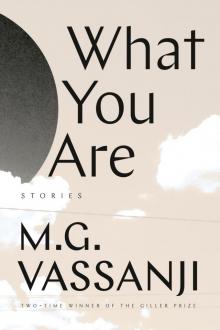 What You Are
What You Are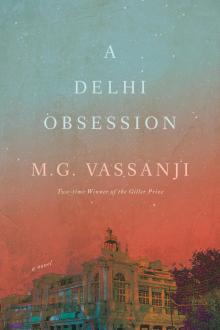 A Delhi Obsession
A Delhi Obsession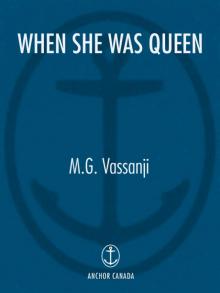 When She Was Queen
When She Was Queen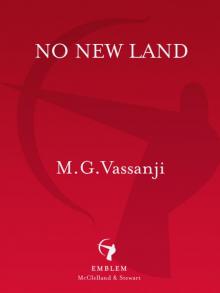 No New Land
No New Land Nostalgia
Nostalgia Mordecai Richler
Mordecai Richler The Book of Secrets
The Book of Secrets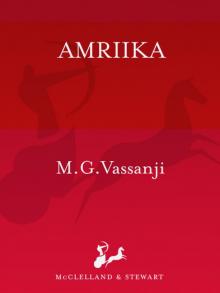 Amriika
Amriika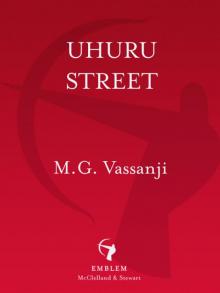 Uhuru Street
Uhuru Street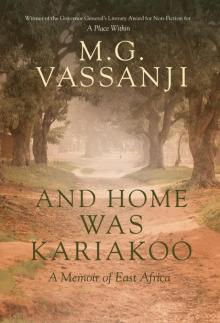 And Home Was Kariakoo
And Home Was Kariakoo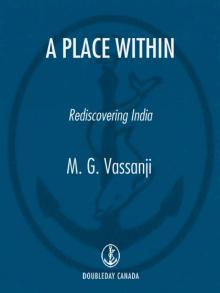 A Place Within
A Place Within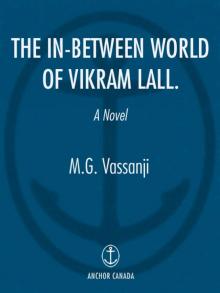 The In-Between World of Vikram Lall
The In-Between World of Vikram Lall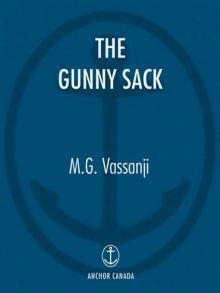 The Gunny Sack
The Gunny Sack